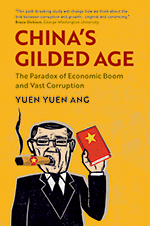***Thank you for your interest in LAPP Distinguished Lecture on "China's Gilded Age: The Paradox of Economic Boom and Vast Corruption". This lecture was sucessfully held on 18 September 2020. For enquiries, please feel free to contact us at <LAPP@ust.hk>.
Why has China grown so fast for so long despite vast corruption? In China’s Gilded Age (2020, Cambridge University Press), Yuen Yuen Ang unpacks the different harm caused by different types of corruption, and challenges the assumption that all corruption impedes growth. She unbundles corruption into four varieties: petty theft, grand theft, speed money, and access money. While the first three types impede growth, access money—elite exchanges of power and profit—cuts both ways: it stimulates investment and growth but produces serious risks for the economy and political system. Since market opening, corruption in China has evolved toward access money. The book explains the evolution of Chinese corruption and how it differs from the West and other developing countries. By unbundling corruption and adopting a comparative-historical lens, she reveals that the rise of capitalism was not accompanied by the eradication of corruption, but rather by its evolution from thuggery and theft to access money.
About the Speaker
Yuen Yuen Ang is associate professor at the University of Michigan Ann Arbor. She is a political scientist and expert on China and emerging economies. She has been also been named an Andrew Carnegie Fellow for “high-caliber scholarship that applies fresh perspectives to the most pressing issues of our times.” On development, Ang’s scholarship focuses uniquely on adaptation and innovation in the face of twenty-first century disruptions. On China, her expertise lies in Chinese political economy and the global impact of China’s rise. he first book to apply complexity and systems thinking to challenge conventional linear models in the political economy of development, with a focus on China’s great transformation since 1978. Ang is the author of an award-winning book, How China Escaped the Poverty Trap (2016), the first book to apply complexity thinking to challenge conventional linear models in the political economy of development. It received the Peter Katzenstein Prize in Political Economy and the Viviana Zelizer Prize in Economic Sociology. The book has generated cross-disciplinary acclaim: in addition to being named “Best of Books 2017″ by Foreign Affairsa, it was acclaimed as “game changing” and “field shifting.” Her latest book China’s Gilded Age: the Paradox of Economic Boom & Vast Corruption (2020), has featured in The Economist, The Wire China and The Diplomat. In addition to China, Ang has conducted field research in Cambodia, India, Malaysia, and Nigeria. She holds a PhD from Stanford University.
A frequently invited speaker, she has spoken at over 100 venues and high-level dialogues around the world. Her talk “How the West and Beijing Got China Wrong” has been viewed more than 160,000 times on Youtube. Professor Ang is profiled in The New York Times, CGTN’s Visionaries, Jiemian (界面), CNPolitics (政見), Pengpai (澎湃), Initium Media (端傳媒).
Personal Information Collection Statement (PICS):
Your personal details collected will be used for HKUST LAPP's and IEMS's future communications, such as any updates to the above event(s). By signing into this webinar, you are agree to the use of your personal data as stated above.
Related Information

Free admission. Jointly organised by HKUST LAPP and Institute for Emerging Market Studies (IEMS).
